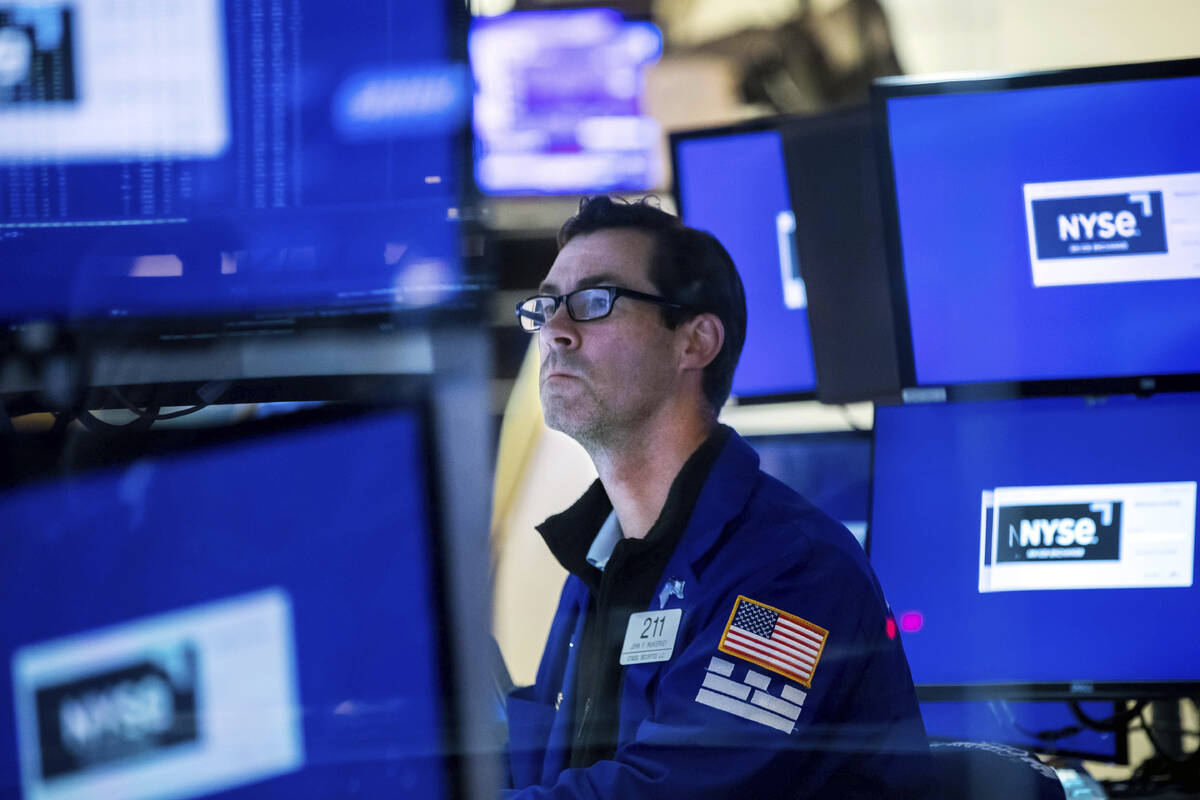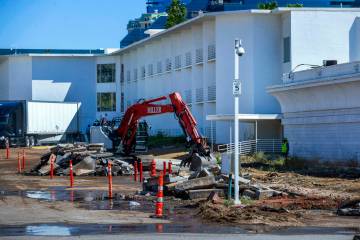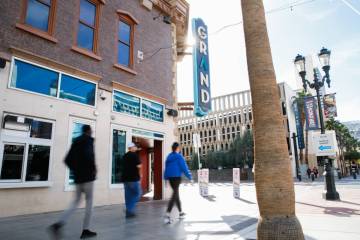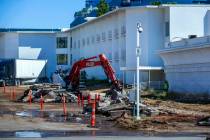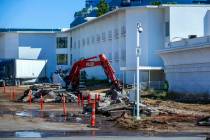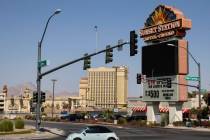Share prices for gaming, tourism stocks level as earnings climb
While first-quarter earnings were strong for most publicly traded gaming and tourism companies, investors didn’t show them much love as share prices treaded water.
Investment analysts said in reports and in interviews last month that Las Vegas operators remain bullish about the future, even as the price of consumer goods soar and stock prices languish.
“Clearly there is a little disconnect between share price and what is going on currently with the operating environment,” said Brendan Bussmann, founder of Las Vegas-based B Global. “You’ve got record revenue but the market is currently more reflective of the nature of the geopolitical landscape and economic headwinds.”
Profitable quarters
Of the 18 stocks of local interest involved in gaming and tourism, 11 reported profitable quarters for the period that ended March 31 and nearly all had year-over-year revenue increases.
The biggest losses were reported by four of the so-called “Big 6” Las Vegas-based casino companies — Las Vegas Sands Corp., Wynn Resorts Ltd., MGM Resorts International and Caesars Entertainment Corp. Three of those — Sands, Wynn and MGM — receive much of their revenue from operations in Macao, which is mired in a huge visitation slump thanks to border closures and lockdowns of entire Chinese cities.
Sands no longer has operations in Las Vegas, putting its faith in its Asian operations in Macao and Singapore. The company reported a net loss of $302 million and revenue declined 16.3 percent to $943 million for the first three months of 2022.
Wynn, which has three resorts in Macao including its hallmark Wynn Palace just off the Cotai Strip, generates revenue in Las Vegas and at its Encore Boston Harbor property. For the quarter, it had a $183.3 million net loss, but revenue increased 29.4 percent to $953.3 million compared with last year.
MGM is partnered with Pansy Ho, daughter of late casino magnate Stanley Ho, for its Macao operations. It also has a domestic empire with properties in Las Vegas, western Massachusetts, Detroit, suburban Washington, D.C., and Mississippi. The company reported a net loss of $18 million, expanding revenue 73.2 percent over last year to $2.85 billion.
Caesars had the biggest loss among local companies — $680 million — but saw revenue increase by 27.9 percent over last year to $2.29 billion. Caesars has invested in technology and intends to sell one of its Strip assets in a bid to bolster the company’s financial performance.
Management upbeat
One thing Las Vegas companies say they have going for them is the belief that international travel and midweek occupancy rates — boosted by conventions, meetings and trade show business — will increase in the months ahead.
Carlo Santarelli, gaming analyst at Deutsche Bank, said after conversations in May with company managers in Las Vegas that he’s convinced rebounds are on the horizon. He compared the current operational environment to the months leading up to the Great Recession in 2007, but with confidence that the worst of COVID-19 is over.
“While stock action speaks to a dramatically different dynamic, overall management sentiment remains very upbeat with respect to current trends, and, perhaps more importantly, indicators of future trends for Las Vegas,” Santarelli said in a report to investors. “While the equity market speaks to the current era as being the fundamental representation of 2007, the top in the prior cycle, with a meaningful slowdown on the horizon, indicators of such a slowdown, such as a softening of future bookings or real time consumer behavioral changes, were not noted or observed. Conversely, as it pertained to Las Vegas specifically, management teams remained very bullish, if not more so than commentary on recent earnings calls would suggest.”
Bussmann agrees.
“For the long term, the investor is still in a good position and there is opportunity for those that want to get into the market now based off of current share price,” he said. “While that is not universal across all gaming stocks, there is a lot of opportunity if you play your cards right.”
He said long-term prospects remain strong for the industry despite the current economic challenges.
“We are in some cases at 2019 levels and in other parts still in recovery,” he said. “Regardless of stock price, this is about maintaining the current trajectory and holding share. Those that will are able to do that and chart a path forward despite the economic concerns will be rewarded long term in share price.”
Santarelli said the upbeat outlook is based on a strong demand environment and higher spending rates per visitor.
“The strength in Las Vegas continues, despite some demand channels that are just starting to come online, with international high-end business still below prior levels, travel from Canada, a strong feeder market, just starting to accelerate, and group business still in the early stages of its recovery,” Santarelli said.
“Operators continue to anticipate a reversion to the mean in spend per visitor, but to date, there has been no evidence of visitors becoming price sensitive with respect to hotel or food-and-beverage pricing. Management did note that it has seen some price sensitivity as it pertains to entertainment, though, in our view, it is possible this simply stems from the breadth of both in-house and citywide events Las Vegas has been hosting.”
Wynn benefits from Resorts World
Santarelli also said most operators didn’t see a negative impact as a result of the opening of Resorts World Las Vegas last June. One company, Wynn Resorts, reported higher foot traffic as a result of the Resorts World opening.
Santarelli also commented on resort transactions in play for both MGM and Caesars.
“As it pertains to Cosmopolitan, MGM believes it can drive increased group mix at the property, which was just 10 percent under prior ownership, and further believes it can potentially physically connect the property to CityCenter via Vdara, a move that should help drive casino traffic to Cosmopolitan,” he said.
“As it pertains to The Mirage, we believe the transaction remains on track for a second half of 2022 close and we expect the property to likely be shut down for a period of time, effectively reducing supply on the Strip. We believe the new product is likely to debut in 2025.”
“We believe Caesars remains on track to announce its Strip asset sale in the late summer,” Santarelli said. “We continue to believe that the sale, in conjunction with the official turnover of the Rio in 2023, will promote stronger yield management, with group and casino mix reducing free and independent travel (45 percent of room nights in 2019) considerably.”
The Review-Journal is owned by the Adelson family, including Dr. Miriam Adelson, majority shareholder of Las Vegas Sands Corp., and Las Vegas Sands President and COO Patrick Dumont.
Contact Richard N. Velotta at rvelotta@reviewjournal.com or 702-477-3893. Follow @RickVelotta on Twitter.



